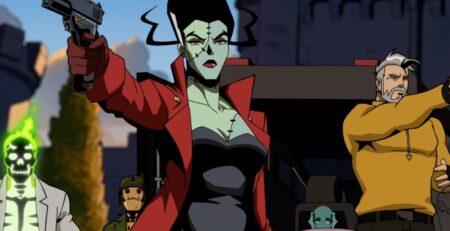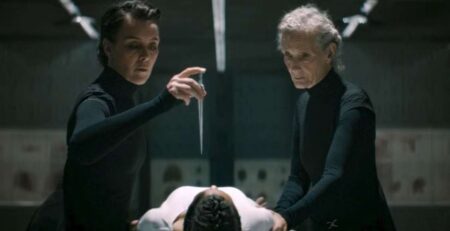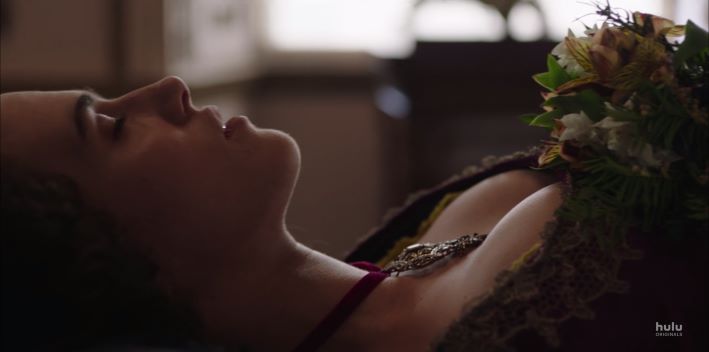
Harlots, the Hulu Original period drama focused on the lives of the marginalized in 18th century London has had a near-perfect two seasons, now in episode four of its third season, viewers and characters are having to deal with the death of the main character Charlotte Wells (Jessica Brown Findlay).
The decision to kill off Charlotte was practical from a series perspective given Findlay’s role in 2020’s Brave New World, but narratively her death wasn’t her own. Having died trying to break a fight between the Pinchers, her death was frustrating. My first inclination, given the centering of the Pincher brothers, is that her death is making way for the new men in the series to receive the spotlight, namely Isaac Pincher (Alfie Allen).
That said, episode four handles the grief of those who knew Charlotte by asking the question: Who gets to grieve? In response to it, we are taken through the lives of the people affected by Charlotte’s murder and not only how they grieve, but how they’re allowed to, if at all. Truthfully, Harlots does a good job by showcasing how massive a role Charlotte played in the women’s stories.
As she lays in state at Lady Fitzwilliam’s house its as if almost every character, large and small, have come to say their goodbyes, even those who should have stayed away. It seems as if the writers know this as Lucy (Eloise Smyth) comments that Charlotte died because she was brave, but as a viewer, she died because of a man who burned her home down. While the women of Harlots have done this to push for justice, the show also uses it as a vehicle to show Charlotte’s impact, however, with an accidental death trying to fight for a man who burned her livelihood, the bravery of Charlotte Wells is lost on me.
When it comes to Wells-North family, William (Danny Sapani) and Margaret (Samantha Morton) are distraught, with the latter unable to come to terms with her daughter’s death. Having laid out many girls, because of the new Justice of the area, Justice Knox says, a girl dies every night, Margaret can not lay out her own.
She struggles to accept that there is no life in her daughter, to dress her body, and to ultimately be present in any moment that doesn’t involve her attention directed to it. As her family mourns her, we get to see the love that her mother and sister, Lucy, had for her. But what hit me more was William’s love and his sorrow.
One of the things viewers, myself included, were worried about last episode, and in episode four as well, is that Margaret is going to choose her husband on paper, the man who saved her from servitude in America, as opposed to by love. While there are still hints of this fear throughout the episode, Margaret’s husband tells William that Margaret’s children may all have different fathers, but they only one Pa. This line is truly one of my favorites in the entire series so far.
My dad is my step-father, but he has never been anything but dad. He loves me, he provided for me, and he is there for me. William is undeniably one of the most loving characters in the show and having that called out by the man who would be his “competition” gives me hope that the writers will not throw Margaret into a love triangle.While they all grieve together, episode four shows how each member of the Wells-North family reacts. Some can feel it, like Lucy and Jacob (Jordan A. Nash), but for William and Margaret, they have to be parents as they focus on bringing justice even when they just want to break.
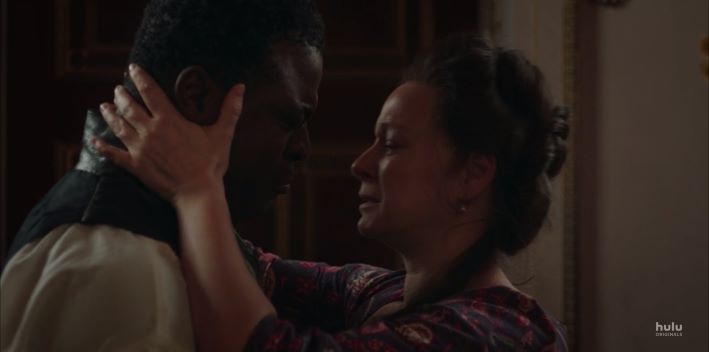
Similarly, the other harlots, women who Charlotte saved or helped with Greek Street want to grieve. They want to fall, but they can’t, culls must be answered and money made. They have to survive, even when one of their own is dead. Harriet (Pippa Bennett-Warner) has to tend to a jealous cull in order to maintain the large sum of money he pays her routinely as her best and only client. While the others must focus on how to get justice or in Emily Lacey’s (Holli Dempsey) case how to save a penny.
Then there is Lydia Quigley (Lesley Manville), Dame Death, the woman who orchestrated the kidnapping of virgins to sell to the Spartans and eventually die. She has been the villain throughout the two seasons. However, she was in Bedlam at the beginning of this season, drawing sympathy from viewers.
In episode four, while the abuse she faced as a child was alluded to other episodes we get to see her confront her abuser, or at least one of them. She is broken by Charlotte’s murder, she wants to cry and pay respects but she can’t. She took the love she had for Charlotte and twisted it, used it as a weapon against Margaret. She is not allowed to be hurt by the loss and immediately seen as a murderer.
While she attempts to grieve we see moments of love in her. She takes a cull so that Kate does not have to. She mourns for Charlotte, and ultimately she shows self-reflexivity on her past actions. But most importantly, for truly the first time, I rooted for her. As she stared down the woman who sold her as a child, as she took stock of her identity and the trauma that got her to the place to she is. While it doesn’t excuse it, for once, the showrunners have made Quigley sympathetic, well, to a point.
But through all of this, there is one portrayal of grief that not only felt unearned but ill-placed, Isaac Pincher’s grief. As he runs madly through the street clutching her dress, crying, we are supposed to have sympathy, but this may be the worst decision next to how they killed her off. Isaac and his pain are a focus point for much of the episode. He is distraught and apparently, he loved Charlotte. We see him steal her dress, threatening Fanny (Bronwyn James) when she demands he leave. We see him walking through the streets crying and putting his brother in harm’s way.
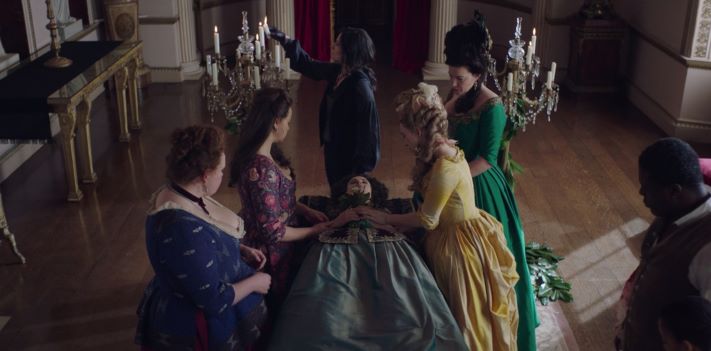
Truthfully, we have known Isaac for all of four episodes. Instead of him, we could have looked into how Nancy (Kate Fleetwood) was grieving, how she was taking it. While she wasn’t Charlotte’s true mother, she was a mother to her. Nancy guided Charlotte while Margaret was in America and throughout the series has repeatedly fought for her and her sister. But instead we some tears as she stands in the background.
We could have seen more of William, of Jacob, of Fanny, but instead, we continue to have a narrative fueled by the Pinchers. Charlotte loved Isabella, but instead, we get Isaac’s “love” on display. While the men in the show have always been present, their pain and their emotion did not take center stage over the women of Harlots. Now, it feels like the whore’s eye view has been switched with the pimp’s and it’s frustrating.
But I have faith in the series to ultimately course correct. I am hoping that the necessity of writing Charlotte out of the series so that the actress can pursue other opportunities is only felt here. Harlots has been one of the most stunning period dramas ever on television – due in large part to its subject matter and perspective. I hope we don’t lose it with Charlotte.
New episodes of Harlots are streamable on Hulu every Wednesday morning.
Harlots, Season 3 - Episode 4
-
Rating - 7/107/10
TL;DR
We could have seen more of William, of Jacob, of Fanny, but instead, we continue to have a narrative fueled by the Pinchers. Charlotte loved Isabella, but instead, we get Isaac’s “love” on display. While the men in the show have always been present, their pain and their emotion did not take center stage over the women of Harlots. Now, it feels like the whore’s eye view has been switched with the pimp’s and it’s frustrating.



